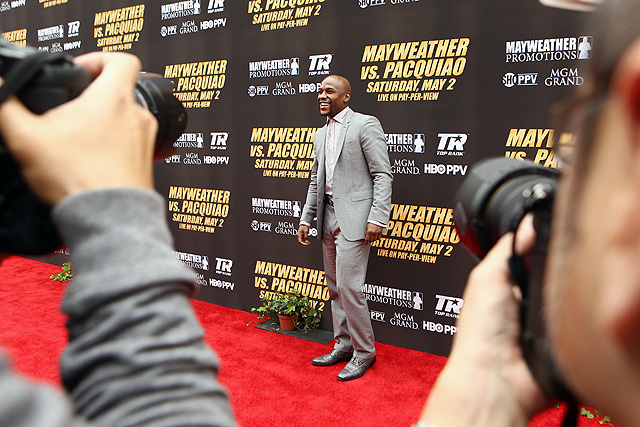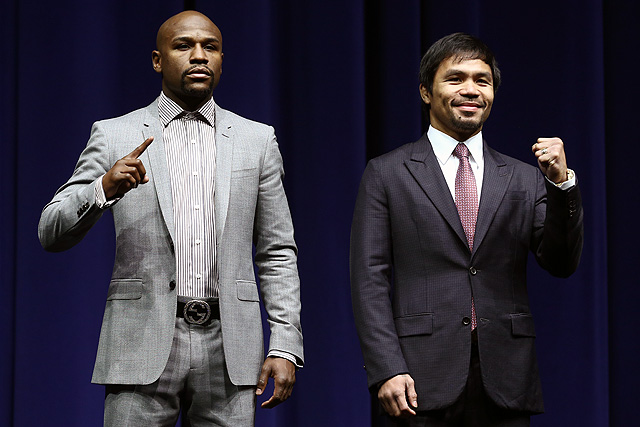Fighting Words on the Red Carpet

Floyd Mayweather and Manny Pacquiao are the talk of the sports
world. | Photo: Dave Mandel/Sherdog.com
LOS ANGELES -- When Floyd Mayweather Jr. and Manny Pacquiao finally fight one another at the MGM Grand Garden Arena in Las Vegas on May 2, an overcast Wednesday in the middle of March featuring a red carpet-covered street and hovering Goodyear Blimp will mostly be forgotten.
Such is the half-life of even the most impressive press events, and the kickoff to Mayweather and Pacquiao’s welterweight unification mega-bout certainly qualified as that. Still, the spectacle at the Nokia Theatre felt like a moment of catharsis for the boxing business, attracting over 750 credentialed media across all platforms. With competing promoters, personalities, television networks and other interested parties now aligned, Mayweather and Pacquiao -- the most important boxers of this era and the men primarily responsible for making this moment -- gave boxing fans what they pined for since the bout was initially proposed five years ago.
Advertisement
“Manny was in Miami judging the Ms. Universe contest and couldn't get back to the West Coast,” said Bob Arum, Pacquiao’s promoter. “There was this ice storm and they couldn't get planes down to Miami. So he was stuck in Miami, and being a basketball fan, and the coach of the Heat being a fellow Filipino, he reached out and got tickets to the game. Lo and behold, across the arena, Floyd Mayweather came in.”
“That’s really what led to it happening,” said Mayweather, who did
most of the talking in his opponent’s suite.
“I didn’t say much,” recalled Pacquiao (57-5-2). “Because I didn’t want to say anything that would offend him and make him leave, but he basically said ‘there’s an A side and there’s a B side to this fight.’ He said it should be a 60-40 split, and I was OK with that. I said ‘OK.’”
And there it was.
Related » Tickets will Range From $1500-$7500
Mayweather said he spent very little time thinking about Pacquiao in the interim. Mayweather claimed to never consider such things, that he “can’t live my life for anyone else” and that by “making nine figures for 36 minutes of work, you have to be a winner.” Mayweather, 38, might admit a potential $100 million payday (depending upon the success of the HBO and Showtime pay-per-view co-venture) would only go so far to ease the ill feelings from his first defeat.
“I never wanted to win a fight so much in my life,” Mayweather said. “He wants to win the same way I want to win.”
Any frustrations that clung to this match were stripped bare in recent months and throughout the course of the day. What emerged is the reality of the boxing’s biggest fight, the “fight of the century” vested parties took to calling it (conjuring comparisons to Muhammad Ali and Joe Frazier), at long last landing a time and place. Bob Arum promoted Ali, once promoted Mayweather, and has promoted Pacquiao since the start. He suggested making comparisons to other mega-fights is a fool’s errand. Too much time passed since the last one; too many things have changed in and out of the boxing world.
“This fight is tremendous. The interest is tremendous,” Arum said. “And we should really wrap ourselves around that fact instead of comparing fights of another era.”
Everyone involved -- Showtime's Stephen Espinoza, HBO's Ken Hershman, Mayweather Promotion's Leonard Ellerbe, Arum and the fighters -- said interest was high on both sides in trying to make the bout, but for one reason or another it didn't happen. There was the drug testing flap. Then other things. Five years later everyone was so chummy you almost forget it took this long for Mayweather and Pacquiao to stand in a room together the way they did, face to face, eye to eye. The anticipation factor, owed in some part to the delay, produced an enormous attraction that is expected to do the biggest business in boxing history. Mayweather knows enormous audiences, in person and online, and it's expected May 2 will turnout his biggest yet. That's saying something. Pacquiao, too, despite two defeats during that stretch. That's saying something as well. Ticket prices for the MGM Grand, the home of 11 straight Mayweather fights, start at $1,500. Just in case you can't nab a ticket, and you likely won't, there will be 30,000 closed circuit locations on MGM properties throughout Las Vegas.
Some of the people watching that night will need to see Mayweather beat the Filipino to finally prove his place in boxing history. Mayweather understandably said he has nothing to prove to anyone, and has many millions of reasons to explain why. Business is one reason Pacquiao kept his mind on “Money” Mayweather. Mostly it was Mayweather's boxing that was responsible for stifling plenty of top talents before him.
It would have been wonderful if this went down after Mayweather's decision of Juan Manuel Marquez and Pacquiao's stoppage of Miguel Cotto in the latter half of 2009. That's when it should have. As annoying as the run up to Mayweather-Pacquiao was over the last half decade, the takeaway is that boxing eventually comes together at the right time and place, as it has before, and good things happen.
While their serendipitous on-court meeting convinced Pacquiao that Mayweather wanted the fight, Leslie Moonves, the president and CEO of CBS Corp., was key in bringing the promotional and TV sides together. It took all that to get one fight made, albeit a very important fight in boxing history, said Pacquiao, who regrouped to win three straight fights after dropping a pair to Timothy Bradley and Juan Manuel Marquez in 2012.
“It’s important for me and for Floyd to have this fight on our records,” he said. “We don't want to leave a question mark in the minds of fans of boxing."
Pacquaio’s Hall of Fame trainer, Freddie Roach, suggested his charge knows how to beat Mayweather. They can recognize when the 11-division champion is resting on the ropes and when he’s trying to set someone up. Roach questioned the state of Mayweather's legs and speed. Roach said the undefeated champion is a diminished a fighter; he doesn't get out of the way like he used to.
“We’ll make the right move when we attack him,” Roach said. “He does make mistakes. He does slip into our power sometimes.”
Because of this Roach believes the chances of Pacquiao, 36, beating Mayweather are better today than they were in 2009.
Training camp has commenced for both fighters. Mayweather said his is off to a perfect start. Roach, meanwhile, established a policy of “get the f--- out” at the Wild Card Gym in Hollywood, where Pacquiao will spend his full camp.
“I had to throw out my good buddy Dave Chappelle and his family,” Roach said. “The thing is they were four bodies that didn't need to be there.”
Rarely prone to trash talk, Pacquiao, a 2.5-1 underdog according to odds makers, suggested that Mayweather, generally regarded as a light puncher, is less worrisome a foe than other boxers he defeated, including Oscar De La Hoya (skill), Antonio Margarito (size) and Miguel Cotto (power). Pacquiao said the delay allowed him to mentally train and prepare for Mayweather.
“I don’t think negative. I only think positive, and I believe that, God willing, I will get the victory on May 2,” Pacquiao said. “I have lost before but losing was an experience that made me a better fighter. It’s part of what builds you up to a higher level.”
Mayweather doesn’t see it like this. He never has. He credited his father and current trainer, Floyd Mayweather Sr., for building him up to be this way.
"One thing I do know about any sport: When you lose, it's in your mind,” Mayweather said. “If you lost once, it's in your mind. If you lost twice, it's in your mind. From Day 1, I was always taught to be a winner no matter what. Be a winner, push yourself to the limit. Stay focused. Be the best you can be.”
Mayweather's desire to remain unbeaten in the pros -- he last "lost" in 1996 as an Olympian in Atlanta, a controversial result he considers discredited -- and depart boxing considered the greatest is why so many people have long felt he'd never step into the ring with Pacquiao.
There was too much to protect.
That theory was rendered moot at the end of February. Now all that’s left is what everyone rightly cares about.
“It's been a long road,” Mayweather said. A red-carpeted one, at that. “But we're here now.”
More




 Boxing Coverage on Sherdog.com
Boxing Coverage on Sherdog.com


